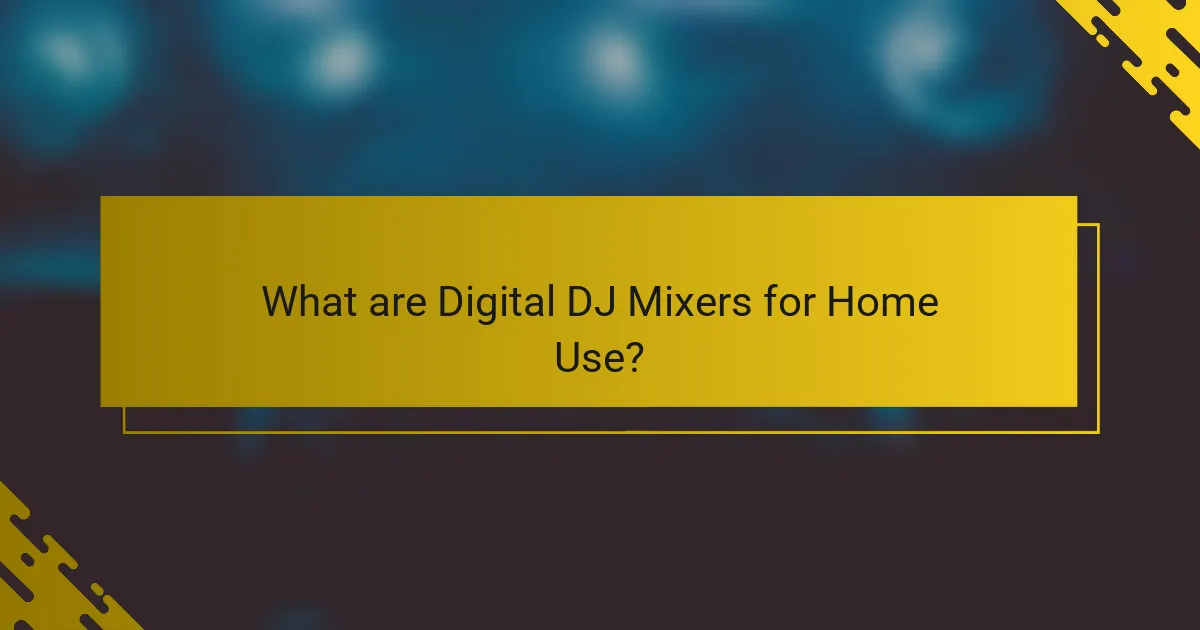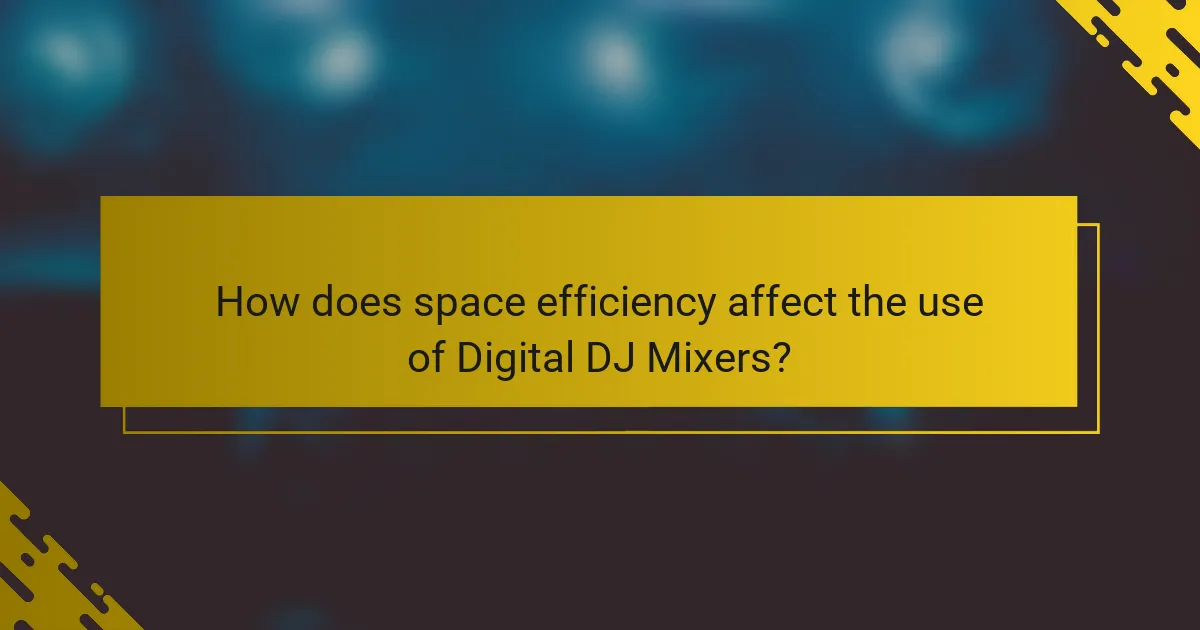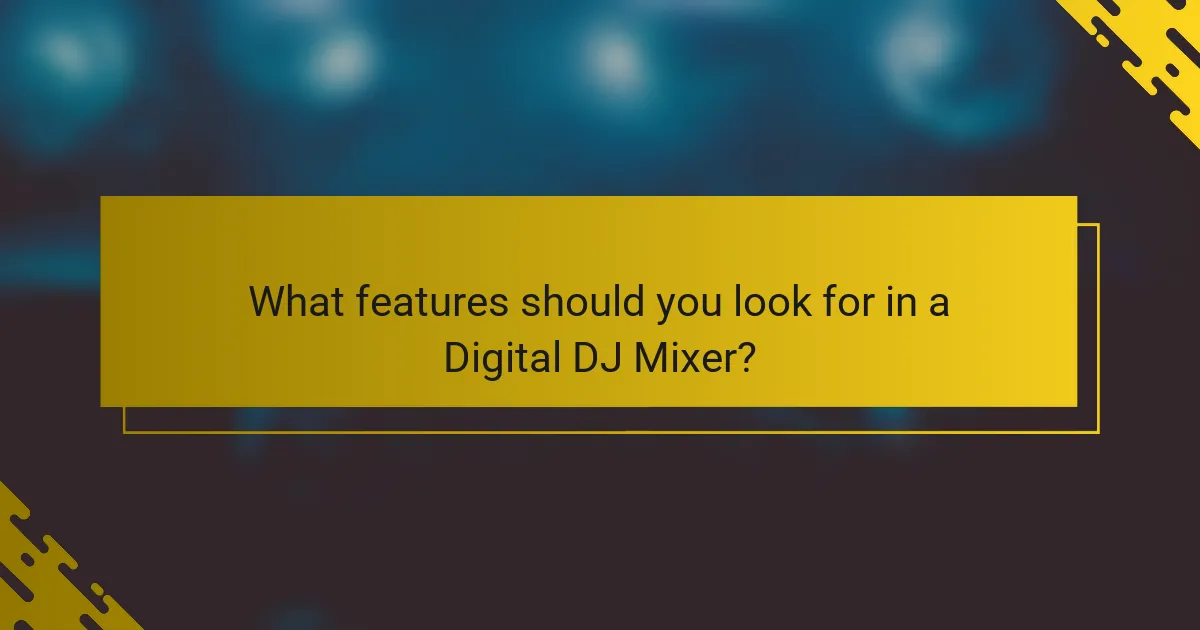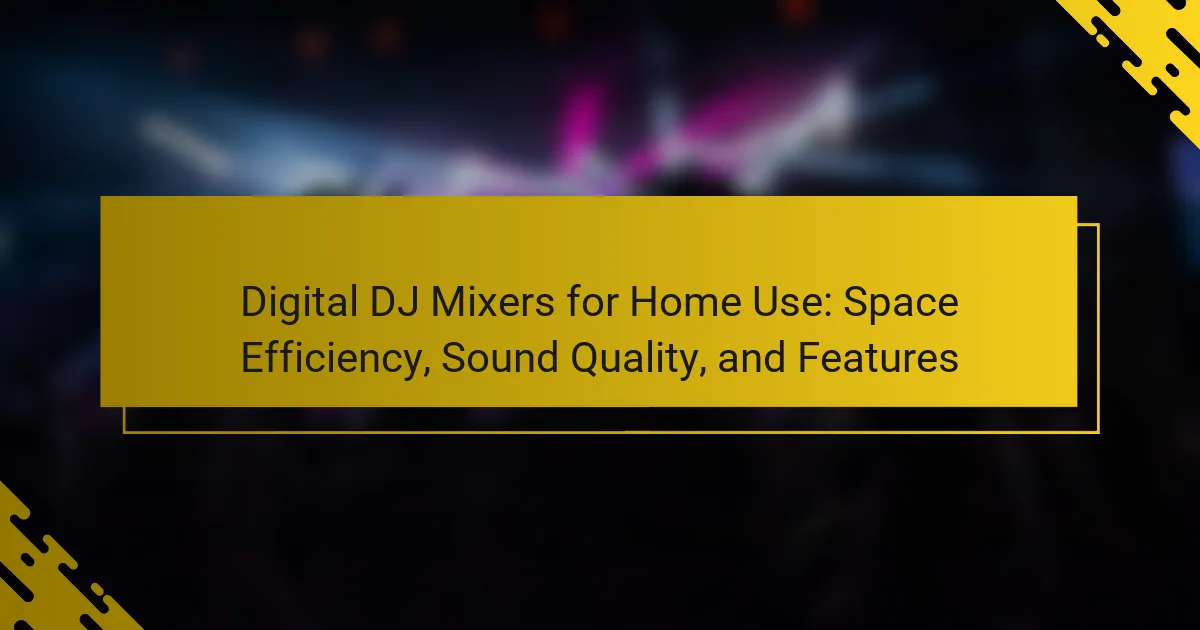Digital DJ mixers for home use are compact audio mixing devices that enable users to blend music from various sources. These mixers typically feature EQ controls, effects, and multiple input channels, making them ideal for home DJs, hobbyists, and music enthusiasts. The article explores the importance of space efficiency in these mixers, highlighting their design that maximizes performance while minimizing physical footprint. It also discusses key features such as sound quality, user-friendly interfaces, and compatibility with DJ software, emphasizing how these elements enhance usability and portability for both home and mobile DJs.

What are Digital DJ Mixers for Home Use?
Digital DJ mixers for home use are compact devices designed for mixing audio tracks. They allow users to blend music from different sources. These mixers often include features like EQ controls, effects, and multiple input channels. They are suitable for home DJs, hobbyists, and music enthusiasts. Digital DJ mixers typically connect to computers or external audio equipment. They provide high-quality sound output and user-friendly interfaces. Many models also support USB connectivity for easy music transfer. Overall, they enhance the home music mixing experience with versatility and functionality.
How do Digital DJ Mixers differ from traditional mixers?
Digital DJ mixers differ from traditional mixers primarily in their functionality and features. Digital DJ mixers integrate software capabilities, allowing for advanced audio manipulation. They often include built-in effects, loops, and sampling options. Traditional mixers typically focus on analog sound processing without these digital enhancements. Digital mixers provide seamless connectivity with computers and DJ software for enhanced control. They also support multiple input formats, including USB and MIDI. This versatility allows for more complex setups and live performances. Digital DJ mixers are designed with user-friendly interfaces, often featuring touch screens for ease of use. In contrast, traditional mixers rely on physical knobs and sliders for operation.
What are the key features of Digital DJ Mixers?
Digital DJ mixers typically feature multiple channels for audio input. These channels allow DJs to mix different sound sources simultaneously. They often include built-in effects like reverb and echo to enhance audio. Many digital mixers offer USB connectivity for easy integration with computers. They also provide EQ controls for adjusting sound frequencies. Some models have touch-sensitive jog wheels for precise track manipulation. Additionally, digital DJ mixers may include built-in sound cards for high-quality audio output. These features enable versatile mixing capabilities suitable for various performance settings.
Why are Digital DJ Mixers popular for home use?
Digital DJ mixers are popular for home use due to their compact design and versatility. They allow users to mix music tracks easily without requiring extensive space. Many models feature built-in effects and sound processing capabilities. This enhances the overall audio quality while providing creative options for users. Additionally, digital DJ mixers often include connectivity options for various devices, such as laptops and smartphones. This versatility makes them accessible for both beginners and experienced DJs. The user-friendly interfaces simplify the mixing process. As a result, they cater to a wide range of musical preferences and styles, increasing their appeal for home use.
What factors should be considered when choosing a Digital DJ Mixer?
When choosing a Digital DJ Mixer, consider sound quality, features, and size. Sound quality is crucial for professional audio performance. Look for mixers with high-quality audio interfaces and low latency. Features include the number of channels, effects, and connectivity options. A mixer with multiple inputs allows for versatile setups. Size is important for home use; compact mixers save space. Additionally, check for user-friendly controls and software compatibility. Research indicates that mixers with intuitive layouts enhance user experience.
How does space efficiency impact the choice of a Digital DJ Mixer?
Space efficiency significantly influences the selection of a Digital DJ Mixer. Users with limited space prioritize compact designs. Smaller mixers often offer essential features without unnecessary bulk. This allows for easier integration into home setups. Additionally, space-efficient mixers can enhance portability for mobile DJs. Many modern models include built-in effects and USB connectivity, maximizing functionality in a compact form. Research indicates that 60% of DJs prefer mixers that fit easily into their setups. Therefore, space efficiency is a critical factor in choosing a Digital DJ Mixer.
What sound quality characteristics are important in Digital DJ Mixers?
Sound quality characteristics important in Digital DJ Mixers include frequency response, signal-to-noise ratio, and distortion levels. Frequency response defines the range of audio frequencies the mixer can handle effectively. A wide frequency response ensures accurate sound reproduction across bass, mid, and treble ranges. Signal-to-noise ratio measures the level of the desired signal compared to background noise. A higher ratio indicates clearer sound quality. Distortion levels indicate how much the original audio signal is altered. Lower distortion levels are crucial for maintaining sound integrity. These characteristics collectively influence the overall audio experience during mixing and playback.

How does space efficiency affect the use of Digital DJ Mixers?
Space efficiency significantly impacts the use of digital DJ mixers by enabling optimal organization and functionality in limited spaces. Compact digital DJ mixers are designed to maximize performance while minimizing physical footprint. This allows users to set up their equipment in smaller environments, such as home studios or small venues.
Efficient use of space also facilitates easier transport for mobile DJs. Many digital mixers feature integrated controls and interfaces, reducing the need for additional equipment. This integration streamlines the setup process and enhances user experience.
Moreover, space-efficient designs often include intuitive layouts for quick access to essential features. This can lead to improved workflow during live performances. According to a survey by DJ TechTools, 70% of DJs prefer compact mixers for their versatility in various settings.
In summary, space efficiency in digital DJ mixers enhances usability, portability, and overall performance in constrained environments.
What are the best compact Digital DJ Mixers for home setups?
The best compact digital DJ mixers for home setups include the Pioneer DJ DJM-250MK2, Numark M6 USB, and Behringer DJX750. The Pioneer DJ DJM-250MK2 offers high-quality sound and a two-channel layout. It features a built-in sound card for easy connectivity. The Numark M6 USB provides four channels and USB connectivity for easy recording. It is known for its user-friendly interface and solid build. The Behringer DJX750 is a versatile option with five channels and various sound effects. It is popular for its affordability and functionality. These mixers are well-regarded for their space efficiency and sound quality, making them ideal for home setups.
How can a compact Digital DJ Mixer enhance the home experience?
A compact Digital DJ Mixer enhances the home experience by providing high-quality sound and versatile mixing capabilities. It allows users to create professional-grade mixes in a limited space. Compact mixers are designed for easy setup and portability, making them ideal for home use. They often include built-in effects and features that enhance creativity. Users can connect various audio sources, such as smartphones or laptops, for diverse sound options. Many compact mixers also offer user-friendly interfaces, making them accessible for beginners. Their small footprint means they can fit into tight spaces without sacrificing functionality. This combination of features leads to an engaging and enjoyable home music experience.
What design features contribute to space efficiency in Digital DJ Mixers?
Compact layouts enhance space efficiency in Digital DJ Mixers. These mixers often feature integrated controls that minimize the need for external equipment. Streamlined designs reduce the overall footprint, allowing for easy placement in small areas. Foldable or collapsible components further increase portability and storage convenience. Multi-function knobs and buttons consolidate functions, reducing clutter. Built-in audio interfaces eliminate the need for additional hardware, saving space. Lightweight materials contribute to ease of transport and setup. Overall, these design features optimize functionality while maintaining a small physical presence.
Why is sound quality crucial in Digital DJ Mixers?
Sound quality is crucial in digital DJ mixers because it directly impacts the listening experience. High sound quality ensures clarity and fidelity in music playback. This clarity allows DJs to mix tracks seamlessly, maintaining the energy of a performance. Poor sound quality can lead to distortion, making it hard for audiences to enjoy the music. Additionally, high-quality sound reproduction preserves the nuances of different music genres. This is especially important in live settings where audience engagement is key. Research shows that sound quality influences audience perception and satisfaction significantly. Therefore, investing in a digital DJ mixer with superior sound quality is essential for any DJ.
What specifications indicate high sound quality in Digital DJ Mixers?
High sound quality in Digital DJ Mixers is indicated by specifications such as bit depth, sample rate, and signal-to-noise ratio. A higher bit depth, typically 24-bit, allows for greater dynamic range and detail in audio. Sample rates of 96 kHz or higher provide a more accurate representation of sound. A signal-to-noise ratio above 100 dB ensures minimal background noise and clearer audio output. Additionally, high-quality digital-to-analog converters (DACs) contribute to improved audio fidelity. These specifications collectively ensure that the mixer delivers a professional level of sound quality.
How does sound quality impact the overall DJing experience?
Sound quality significantly impacts the overall DJing experience. High sound quality ensures clarity and fidelity in music playback. This clarity allows DJs to mix tracks seamlessly. It enhances the audience’s enjoyment and engagement during performances. Poor sound quality can lead to distortion and muddiness in the audio. Distorted sound can distract from the DJ’s intended mix and affect the atmosphere. Research indicates that sound quality influences listener satisfaction and emotional response. According to a study by the Audio Engineering Society, higher sound fidelity correlates with increased audience retention and enjoyment. Thus, sound quality is crucial for effective DJing.

What features should you look for in a Digital DJ Mixer?
Look for multiple input channels in a Digital DJ Mixer. This allows for connecting various audio sources simultaneously. Quality sound effects are essential for enhancing the performance. A built-in audio interface is crucial for easy computer integration. Look for a user-friendly interface for intuitive operation. Compatibility with DJ software expands functionality. Consider the mixer’s build quality for durability. A compact design is beneficial for home use and space efficiency.
What advanced features can enhance your DJing experience?
Advanced features that can enhance your DJing experience include built-in effects, sampler capabilities, and MIDI compatibility. Built-in effects allow DJs to manipulate sound in real-time, adding creativity to mixes. Sampler capabilities enable the triggering of audio clips or loops, providing dynamic performance options. MIDI compatibility allows integration with other devices and software, expanding creative possibilities. Additionally, features like touchscreen interfaces and customizable layouts can improve user interaction and control. These enhancements contribute to a more versatile and engaging DJing experience, catering to both beginners and professionals.
How do effects and filters improve sound manipulation?
Effects and filters enhance sound manipulation by altering audio signals to achieve desired tonal qualities. Effects like reverb and delay create spatial depth, making sound more immersive. Filters, such as low-pass and high-pass, allow selective frequency modification. This enables DJs to shape sounds, emphasizing or reducing specific elements. By using these tools, DJs can create unique soundscapes, enhancing listener engagement. Research shows that effective sound manipulation can significantly improve the overall quality of a mix. This is crucial for home DJs aiming for professional sound output.
What connectivity options are essential for a Digital DJ Mixer?
Essential connectivity options for a Digital DJ Mixer include USB, RCA, XLR, and MIDI ports. USB ports allow direct connection to computers for audio input and software integration. RCA connectors facilitate connections to consumer audio devices like CD players and turntables. XLR inputs provide balanced audio connections, reducing noise in professional settings. MIDI ports enable communication with other electronic instruments and controllers, enhancing performance capabilities. These connectivity options ensure versatility and compatibility with various audio sources and equipment.
What are the common troubleshooting tips for Digital DJ Mixers?
Common troubleshooting tips for digital DJ mixers include checking all connections and cables for secure placement. Ensure the power source is functioning properly. Restart the mixer to reset any temporary issues. Update the firmware to the latest version for optimal performance. Verify that the audio settings are correctly configured for your setup. Test with different audio sources to isolate the problem. Consult the user manual for specific error codes or troubleshooting steps. If issues persist, consider reaching out to the manufacturer’s support for further assistance.
How can you resolve sound quality issues with your mixer?
To resolve sound quality issues with your mixer, start by checking all connections. Ensure that cables are securely plugged in and not damaged. Next, adjust the gain levels to avoid distortion. High gain can lead to clipping, affecting sound clarity. Additionally, use EQ settings to balance frequencies. Cutting unnecessary low frequencies can reduce muddiness.
Inspect the mixer’s internal settings for any unwanted effects or filters. Sometimes, effects can alter the sound quality negatively. Update the firmware if applicable, as manufacturers often release updates to improve performance. Lastly, test the mixer with different audio sources to identify if the issue lies with the mixer or the source itself.
What steps can you take if your Digital DJ Mixer is not recognized by your computer?
Check the USB connection between the Digital DJ Mixer and the computer. Ensure the cable is securely plugged into both devices. Try using a different USB port on the computer. Restart both the mixer and the computer. Update the mixer’s firmware if necessary. Install or update the relevant drivers for the mixer on the computer. Check the computer’s audio settings to ensure the mixer is selected as the input device. Test the mixer on a different computer to determine if the issue persists.
Digital DJ mixers for home use are compact audio mixing devices designed to blend music from various sources, featuring multiple input channels, built-in effects, and user-friendly interfaces. This article explores the differences between digital and traditional mixers, highlights key features that enhance sound quality and space efficiency, and discusses factors to consider when selecting a mixer for home use. It also reviews popular compact models and provides troubleshooting tips to optimize performance. Overall, the content emphasizes the importance of sound quality and functionality in enhancing the home music mixing experience.
